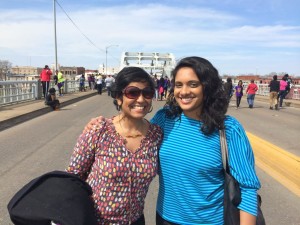Executive Director
South Asian Americans Leading Together (SAALT)
This weekend, I had the amazing opportunity to be in Selma, Alabama to mark the 50th anniversary of Rev. Martin Luther King, Jr.’s historic march to galvanize support for the passage of the Voting Rights Act of 1965 (pictured Suman Raghunathan with fellow marcher Lakshmi Sridaran).
SAALT joined an AAPI delegation that included the Asian Pacific American Institute for Congressional Studies (APAICS) and the Japanese American citizens League. Along with other AAPIs, JACL was one of the original organizations that joined the historic march on Selma fifty years ago
Thousands of people converged upon the small town of Selma this weekend in a wave of humanity determined to never forget Dr. King’s insistent demand for the full enfranchisement of African Americans in the face of violent opposition from then-Governor George Wallace and Alabama state troopers. This weekend’s crowd was largely African American, though there were sizable numbers of White, Latino, and faith communities. Labor unions also brought large delegations to the event: notably RWDSU and SEIU, which organizes home health care workers. Dozens of buses from as far as New York City took over all available parking spaces, curbs, and even some sidewalks in Selma near the Edmund Pettus Bridge.
Folks gathering in Selma to March across the Edmund Pettus Bridge-huge crowd here. #Selma50 #AAPIs4Selma pic.twitter.com/deyCyeGuqA
— Suman Raghunathan (@SumanSAALT) March 8, 2015
Everyone was jubilant, though many remained intent upon the need to preserve, indeed reinstate sections of the Voting Rights Act struck down last year by the U.S. Supreme Court. Marchers broke into spontaneous and joyous song several times, singing ‘We Shall Overcome’ and other anthems of the civil rights movement. Immigrant and labor rights organizers led time-honored chants first coined by Cesar Chavez, the legendary farmworker organizer of the 1960’: “El pueblo unido hamas sera vencido” (‘The people united will never be defeated’) and ‘Si se puede’ (‘Yes We can’, which was adopted 40 years later by the campaign of another community organizer, then-Senator Barack Obama.
Participants included Mary, a 53-year old grandmother and Selma resident herself who joined the march with her grandson, Kamaris. Mary told me she was proud to join the march this weekend, and particularly enjoyed the President’s speech on Saturday, March 7th, in Selma, which she recorded. She said, with tears in her eyes, “I wonder if Dr. King ever would have thought we’d have a Black President?”
The Sunday march also included a moment of drama evocative of the conflict on Bloody Sunday fifty years ago: police attempted to bar marchers from crossing over the bridge at one point, citing it ‘needed to be cleaned’ after hundreds had already amassed at the site. Reversing the dynamic of fifty years ago, however, marchers defied police and refused to be stopped – they crossed the bridge, and did so many more times over the course of the afternoon.
Gens coming tgthr to mark the 50-year anniv of march over Edmund Pettus Bridge: 'Hell no, we won't stop'#AAPIs4Selma pic.twitter.com/RuLmxGPGiP
— Suman Raghunathan (@SumanSAALT) March 8, 2015




